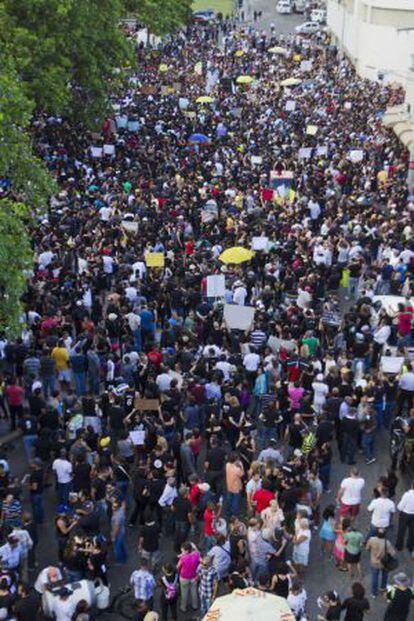Tax hikes spark protests in Dominican Republic
Government says measures are needed to tackle deficit

Protesters have taken to the streets of Santo Domingo, the capital of the Dominican Republic, over the last week following a series of tax hikes passed by the government on November 6. Taking their lead from Spain's 15-M grassroots protest movement, more than 50 civic organizations and labor unions have staged marches and meetings in the wake of fiscal reforms aimed at tackling the country's spiraling fiscal deficit.
A medical student was shot dead on November 8 on the campus of the Dominican Republic's largest public university during a violent confrontation between the police and protestors. Witnesses said the student was not taking part in the protest on the campus of the school, the Autonomous University of Santo Domingo, which has about 180,000 students, but he seemed to have simply been caught nearby.
The demonstration, involving hundreds of people, turned hostile when young men in masks began throwing rocks at the police. A police spokesman in Santo Domingo said the shooting was under investigation. Several students said they were angered not just by the tax increase, but also by plans to privatize all or part of the university.
Opponents of the government blame the spike in the Dominican Republic's deficit to outgoing president Lionel Fernández of the Dominican Liberation Party who spent millions on infrastructure projects, partially aimed at "securing" his legacy. Big spending programs also helped his hand-picked successor, Danilo Medina, to win the presidential election in May.
A medical student was shot dead on the largest public university campus
President Danilo Medina's package of tax changes, which would increase government revenue by about two percent of GDP, aims to help close a $4.6-billion budget deficit by raising the national sales tax to 18 percent from 16 percent. Food, fuel and other staples will all be affected by the increase. The bill was approved by a 30-0 vote in the Senate on November 2 and won the support of 127 of 190 deputies four days later.
Dominican lawmakers said they had no choice but to approve the tax bill as the protests gathered pace. The tax overhaul was referred to by Medina as "a bitter pill to swallow."
Protestors who have taken to the streets of Santo Domingo and other Dominican cities say they understand that there is a debt problem. But they believe the government should cut its own expenditure, instead of hitting citizens with new taxes.
"Taxes on fuel and the increase in sales taxes are going to make the production and transport of food, services and practically all consumer goods more expensive," opposition groups Movimiento Justicia Fiscal and Foro Social Alternativo said in a joint emailed statement. "If the tax package is approved, poverty will increase and there will be more hunger and misery."
Food, fuel and other staples will all be affected by the tax increase
"We pay all these taxes, and we see nothing in return," said Ivel Cenac, a graphics designer, by phone from the Dominican capital. Cenac says that government corruption and overspending have led to the country's bloated deficit, mentioning Education Minister Josefina Pimentel, whose salary was raised from $4,660 to $7,500 per month while tax increases were being discussed by the country's Congress.
President Medina says that if the Dominican Republic does not decrease its deficit, it will be more expensive for the country to borrow money from banks, and to sell bonds. He says funding is needed to implement poverty-reduction programs and education initiatives that the country needs and which he promised to deliver during his presidential campaign.
While the protests against the fiscal reforms have momentum, observers say they are not likely to turn into a massive social movement that will destabilize the current government.
Local media reported that around 6,000 people attended the protest at Santo Domingo's Independence Park, according to local media reports. More than two million people live in Santo Domingo's metropolitan area.
The Dominican Republic's economy has been performing well recently. Propelled by tourism, mining and manufacturing, GDP growth has been among the fastest in Latin America over the past three years, registering a rise of 4.5 percent in 2011.










































